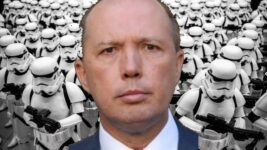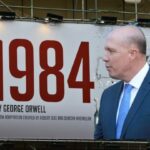The Return of the Dutton: The Coalition Strikes Back With the Archconservative

With that other guy having stepped down as leader of the federal Liberals after losing the election, and other favoured members having fallen by the wayside during the vote, ultraconservative Peter Dutton is set to step into the role of leader of the Coalition.
While it’s true that Dutton’s fronting the Liberal Nationals in opposition, won’t see him making any ultimate decisions, his leadership does indicate that the Coalition is maintaining its hard-right stance, which is certain to influence what’s permissible in terms of government policy.
In not wanting to frighten the general public too much with this decision, Dutton appeared in the press this week with his wife and teenage children in tow, to reveal the softer side of the former immigration minister who once lorded it over desperate refugees offshore in the extreme.
In a statement, Peter explained that he’s held some hard positions in the past, such as serving as a police officer and home affairs minister, but he hopes, “in moving from such tough portfolios, the Australian public can see the rest of” his character. The side his “family, friends and colleagues see”.
The real concern here is that while the country has voted against the whitebread major party duopoly, with a large number of Greens and climate-minded independents now in both chambers, having Dutton standing opposite him will be a good excuse for Albanese not to get too progressive.
White is right
Since moving into the role of immigration minister in late 2014, Dutton has been repeatedly warning the Australian public to fear the Other. And for the most part that’s been the non-white citizens of the planet, seeking to move in on our territory whether that be by rickety refugee boat or warship.
Dutton was one of the few MPs to walk out of parliament during Kevin Rudd’s 2008 apology to the Stolen Generations, and when explaining why, he rolled out some of the most typical racist tropes certain Anglo Australians use to justify the continuing oppression of First Nations people.
During his years of policing immigration, Dutton suggested that refugees coming to this country couldn’t even count or read in their own language, “let alone English”, and if his government let them resettle here, they’d “be taking Australian jobs”.
The then minister further lamented 1970s Lebanese immigration to this country as a mistake, he lied about Manus Island detainees trying to coax a five-year-old boy into their prison, and he suggested that women on Nauru seeking post-rape abortions were “trying it on” to get to the mainland.
In early 2018, Dutton stated that Melburnians were too afraid to go out due to a non-existent African gang crisis. And in the midst of all these slurs about people of colour, he suddenly found a human rights cause he could champion, which was saving “persecuted” white South African farmers.
More and more law and order
In December 2017, then prime minister Malcolm Turnbull realised that Dutton was being wasted upon the simple task of brutalising foreigners in detention centres, so the Home Affairs super-ministry was created to provide him with the keys to all forms of punishment.
Having previously served as a Queensland police officer for a decade, Dutton was well placed to go haywire in rolling out multitudes of rights eroding enforcement and intelligence laws with the aim of combating all the terrorists, paedophiles and drug traffickers barking at the front door.
During his time in Home Affairs, Dutton oversaw the drafting and implementation of a series of national security bills, which served to break open online accounts and electronic devices to not only allow intelligence and law enforcement to have a gander but also to alter and delete data while at it.
Of course, Dutton didn’t initiate the construction of the Australian surveillance state. This has been a bipartisan project since 9/11. However, he certainly excelled at the job and after he’d left his post he still succeeded in turning foreign spying agencies on domestic targets.
So, as the Albanese government continues the two-decades-old national security drive, a newly appointed home affairs minister can certainly look across the chamber and note a glint in Dutton’s eye that says, “The harsher the laws the better, mate. We’ll pass ‘em through.”
War monger-in-chief
Dutton was transferred to the defence portfolio in late March last year, and again, he did exceptionally well in the role, as he geared the country up in readiness for war with our biggest trading partner and spent big on weaponry to the benefit of the military industrial complex.
By this time last year, the new defence minister had announced that the nation was already on something of a war footing with China, as it was engaged in a new form of conflict not traditionally recognised as war. This he branded as “grey zone” warfare, which consists of cyberattacks.
But he didn’t stop there, Dutton spent the next 12 months comparing this time in international affairs with the build up to World War II, as he likened the rise of the Nazis to the growing ambitions of Xi’s China, and he committed the nation into following the US into war with Beijing over Taiwan.
Albanese’s first move as leader of the nation was to join a Quad meeting in Japan. This is an old alliance between Washington, Tokyo, New Delhi and Canberra that has taken on renewed significance with the rising prospect of war with China.
So, again, any government policies being considered that mark a bolstering of military build-up in the Indo Pacific region, will get the thumbs up from the Dutton-led opposition.
Battlelines redrawn
That’s the real danger with having Dutton heading up an ultra-conservative Coalition. Despite the stark turn around in voters calling for a more rights-adhering, diversity-embracing society, it’s still the conservative old white boys club playing off one another in parliament.
And while Albanese said during his victory speech that “together we can end the climate wars” and “take advantage of the opportunity… to be a renewable superpower”, the new PM had only just been telling the coal industry not to worry in April, as his side supports new fossil fuel initiatives too.
Last Saturday, the nation voted overwhelming for climate action. The Greens and progressive independents in parliament have vowed to push government climate policy so that it better reflects the dire steps that need to be taken in order to deal with the escalating crisis.
But back in the late 1990s, it was said that the inclusion of Pauline Hanson in the parliamentary mix proved positive for the Howard government, as the extreme rhetoric coming from her side of the chamber served to blunt the edge of the ultraconservative line it was taking.
So, with a hardline pro-fossil fuel pitch coming across the room from Dutton, the Nationals with Barnaby Joyce likely at the helm, and deputy Liberal leader former anti-environment minister Sussan Ley, any slightly climate damaging policies coming from the Albanese side will appear mild.







